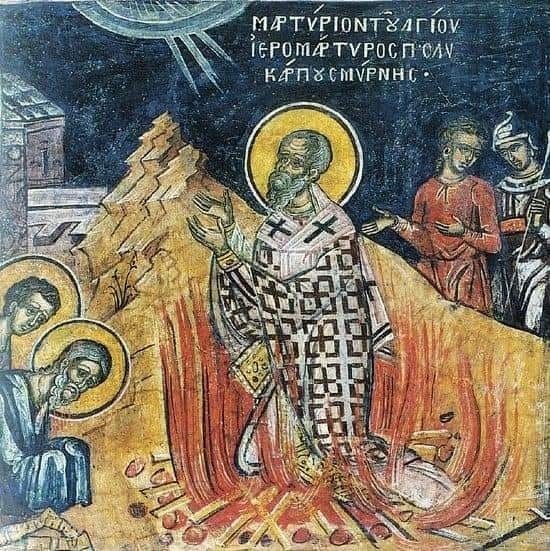Saint Polycarp, Bishop of Smyrna, was born around the year 80 in Asia Minor, in the city of Smyrna. Orphaned at a young age, he was raised, according to an angel's instruction, by the pious widow Callisto. After the death of his adoptive mother, Polycarp distributed his estate and led a chaste life, serving the sick and the weak. The holy Bishop of Smyrna, Bucolus (commemorated on February 6), grew very fond of him and drew him close, ordaining Polycarp as a deacon and entrusting him with preaching the Word of God in the temple.
At that time, Saint John the Theologian was still alive. Saint Polycarp was especially close to Saint John the Theologian, whom he accompanied on his apostolic journeys. Saint Bucolus ordained Saint Polycarp as a presbyter and, shortly before his death, bequeathed that he be appointed as bishop of the Smyrna chair. When Saint Polycarp was being consecrated as a bishop, the Lord Jesus Christ appeared to him. With apostolic zeal, Bishop Polycarp led his flock. He was greatly loved by the clergy and was warmly regarded by Saint Ignatius Theophorus. On his way to Rome, where he faced execution (he was torn apart by wild beasts), he wrote to Saint Polycarp: "As sailors require winds, or those storm-tossed need a haven, so does the present time need you to reach God."
Emperor Marcus Aurelius (161 - 180) ascended to the Roman throne, and one of the fiercest persecutions against Christians was launched. The pagans demanded that the judge seek out Saint Polycarp - "the father of all Christians" and "the corrupter of all Asia." At this time, at the insistent request of his flock, Saint Polycarp stayed in a small village near Smyrna. When soldiers came for him, Saint Polycarp met them and ordered that they be fed, while he himself prayed, preparing for his martyrdom. His suffering and death are described in the "Letter of the Christians of the Church of Smyrna to other Churches" - one of the earliest monuments of Christian literature. Brought to trial, Saint Polycarp firmly confessed his faith in Christ and was sentenced to be burned. The executioners wanted to nail him to the stake, but he calmly told them that he would not come down from the fire, and they only tied him with a rope. The flames surrounded the saint but did not touch him, converging in the air above his head. Seeing that the fire did not harm him, the crowd of pagans and Jews demanded that he be killed with a sword. When Saint Polycarp was wounded, so much blood flowed that it extinguished the flames. The body of the holy martyr Polycarp was burned. The Christians of Smyrna reverently collected his holy remains, honoring his memory.
A story about Saint Polycarp by his disciple, Saint Irenaeus of Lyons, is preserved, which Eusebius quotes in the "Church History" (V, 20): "I was still very young when I saw you in Asia Minor at Polycarp's side, - Saint Irenaeus addresses his friend Florinus - ...I could now point out the place where the blessed Polycarp sat and talked, - I could depict his walk, his way of life, his appearance, his talks to the people, his friendly dealings with John, as he himself narrated, and with other eyewitnesses of the Lord, - how he remembered their words and recounted what he had heard from them about the Lord, His teachings, and miracles... By the grace of God to me, I then listened attentively to Polycarp and recorded his words not on a slate, but in the depths of my heart... And so, I can testify before God, that if this blessed and apostolic elder had heard anything like your error, he would have immediately blocked his ears and expressed his indignation with his usual saying: 'Good God! How long hast Thou allowed me to live to see this.'"
In his lifetime, the saint wrote several Epistles to the flock and letters to various persons. His Epistle to the Philippians, which, according to Blessed Jerome, was read in the churches of Asia Minor during the Divine Service, has survived to our time. It was written by the saint in response to the Philippians' request to send them the letters of the holy martyr Ignatius Theophorus that were preserved by Saint Polycarp.



